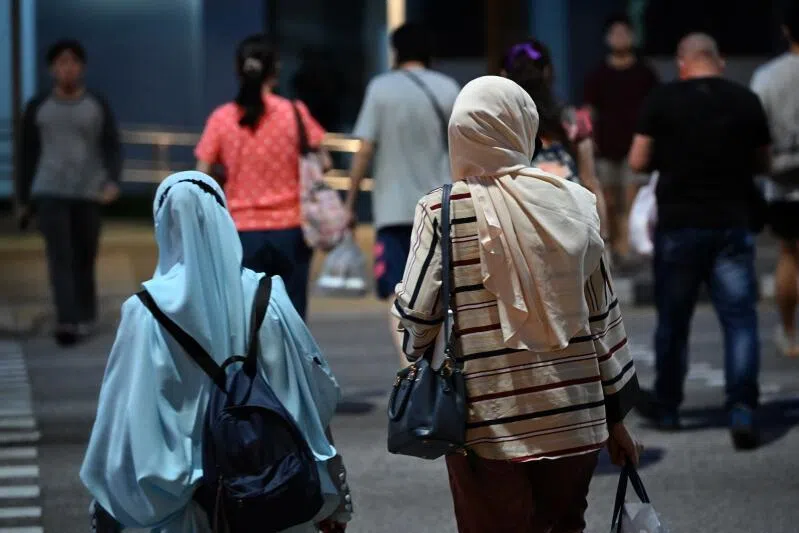New laws, tudung policy shift cited in S’pore’s update under UN treaty against racial discrimination
Sign up now: Get ST's newsletters delivered to your inbox

In a report to the UN, Singapore said it is fully committed to working towards a society free from racial discrimination.
ST PHOTO:l CHONG JUN LIANG
Follow topic:
SINGAPORE – Singapore has put in place new legislation over the past seven years to guard against racial discrimination and has submitted these developments in a report to the United Nations.
It did so under requirements for the International Convention on the Elimination of All Forms of Racial Discrimination (ICERD), a UN treaty which Singapore signed in October 2015 and ratified in November 2017.
The report affirms the country’s commitment to eliminating racial discrimination and strengthening social harmony, the Ministry of Culture, Community and Youth (MCCY) said in a statement on Nov 27.
This is a combined second to fourth report following the initial one submitted in 2018 after Singapore ratified the agreement.
Acting Minister for Culture, Community and Youth David Neo said in a foreword to the report that forging a common national identity while maintaining racial and religious harmony is of “paramount importance” to the Republic.
Singapore is fully committed to working towards a society free from racial discrimination – in line with its obligations under ICERD and another UN framework, the Sustainable Development Goal 10, on reducing inequality, he added.
The report highlights new laws that have been put in place since 2018 as well as additional efforts to support the Malay/Muslim community.
It also responded to comments on the 2018 report made by a UN committee in 2022, which included recommendations in several areas, including the criminal justice system, migrant worker rights and the situation of ethnic minorities.
The Government uses a combination of levers to “effectively combat racial discrimination and protect human rights”, the report said. These include legislative safeguards and policies and programmes that protect the interests of racial minorities and encourage social mixing.
They are periodically reviewed, it added.
On new and amended legislation, the report noted that Parliament passed the Workplace Fairness Act in January 2025, aimed at addressing discrimination on the basis of race, language or religion.
The law also introduces provisions for workers to seek redress via private civil claims if they have faced workplace discrimination.
Singapore also enacted in 2025 the Maintenance of Racial Harmony Act, which consolidates existing race-related offences and clarifies the scope of conduct of such offences, the report said.
The Act also introduces softer measures to encourage reconciliation and better understanding between races.
The Government also amended the Maintenance of Religious Harmony Act in 2019 to better combat the growing use of the internet and social media to spread hate and address the threat of foreign influence through religious bodies, the report said.
As the law alone is insufficient to combat racial discrimination, the Government also actively implements policies and establishes platforms to maximise common space and strengthen cultural cohesion, it said.
This includes social mixing policies in public housing, schools and national service.
The report also addressed the rights and freedoms of Singaporeans regardless of race, and cited a 2021 decision to allow Muslim women working in public healthcare to wear a headscarf with their uniform.
This followed extensive consultation with community and religious leaders, as well as medical experts, taking into account evolving societal attitudes, it said.
The report added that the Government has strengthened collaboration with key religious and community institutions within the Malay/Muslim community, to improve service delivery and expand efforts to uplift minority communities.
These efforts include reducing the recidivism rate; supporting vulnerable individuals, marriages and families; empowering youth; creating a more resilient workforce; and supporting community health initiatives.
“These efforts translate into tangible outcomes, such as in the form of higher educational attainment, home ownership and employment in the Malay/Muslim community,” it said.
Singapore disagrees with UN recommendation to suspend death penalty
The report also responded to comments from the UN committee assessing the 2018 report on the criminal justice system.
It said that ethnicity, race and socio-economic status play no part in the professional discharge of duties by law enforcement agencies in Singapore.
They also do not affect the prosecutorial decisions of the Public Prosecutor, nor the decisions of the judiciary.
The committee had recommended that Singapore review and amend its laws and policies “leading to racially disparate impacts in the criminal justice system”.
It expressed concern that ethnic minorities, particularly Malays, are overrepresented in the criminal justice system, especially among people sentenced to the death penalty for drug offences.
The report said Singapore’s laws apply equally to all, regardless of race, colour, descent, ethnic origin, religion or nationality, pursuant to its obligations under ICERD.
The committee also recommended that Singapore apply a moratorium on the death penalty with a view towards abolishing it, and prohibit the use of corporal punishment such as caning.
In response, the report said: “We respectfully disagree that the solution to any perceived racially disparate outcomes in the criminal justice system is to soften our approach on crime.”
To adopt this approach would be to make justice dependent on ethnicity and socio-economic status, which cannot be the case, it said.
It added that there is no international consensus against the use of the capital punishment or that such punishment amounts to torture, or cruel, inhuman or degrading treatment when it is imposed in accordance with the due process of law and judicial safeguards.
“Sovereign states retain the right to determine the most appropriate penalties in accordance with their national circumstances, in accordance with their international law obligations,” it noted.
Drug addiction is a complex problem that affects all segments of society, and the Government works with various community partners across racial and religious groups to ensure a “culturally sensitive” approach in putting out anti-drug messages and supporting people with drug addiction, it said.
The report also addressed concerns raised by the UN committee about the vulnerabilities faced by migrant workers.
These include concerns that they are open to abuse and exploitation, about their rights to form and join trade unions, and the availability of channels for feedback.
The report cited Singapore’s strong regulatory frameworks that safeguard the well-being of migrant workers and migrant domestic workers, and highlighted initiatives put in place to remedy some of these vulnerabilities. These include a helpline established in 2022 for migrant domestic workers to provide ground feedback and peer support.
The report was developed in consultation with young people, religious and community leaders, community organisations and civil society organisations, MCCY said.
ICERD was adopted by the UN General Assembly on Dec 21, 1965, and is the oldest of the UN’s nine core international conventions on human rights.


